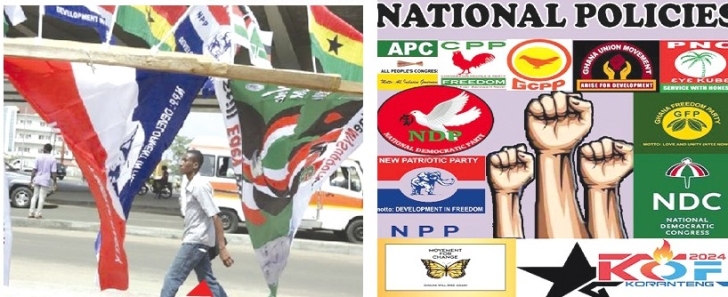The post-independence history of political parties in Ghana is quite intriguing. During the first republic, a constitutional amendment resulted in a ban on all opposition political parties. Only one political party was declared legal.
In 1972 and 1981, when our multiparty democracies were interrupted by a military coup, the activities of political parties were banned.
A key step during Ghana’s transition to multiparty democracy in 1992, after a decade-long military rule, was lifting the ban on political parties and their activities.
The last 32 years have seen the longest uninterrupted history of political parties and their activities in post-independence Ghana.
This opinion piece uses data from ten rounds (1999, 2002, 2005, 2008, 2012, 2014, 2017, 2019, 2022, 2024) of the Afrobarometer survey to describe Ghanaian sentiments about political parties and implications for their role in sustaining and consolidating Ghana’s democracy.
Key Insights from the Afrobarometer Survey
Detachment from political parties. In 1999, when the survey asked “Do you feel close to any particular political party?” seven out of 10 Ghanaians (67 per cent) answered “yes”.
This dropped to six out of 10 Ghanaians (60 per cent) in 2014.
Since then, there has been a steady drop in how many Ghanaians say they feel close to a particular political party by as much as 25 percentage points.
For the first time in the history of the survey, more Ghanaians (52 per cent) say they do not feel close to any particular political party compared to those (45 per cent) who say they do.
Party preference
In the survey, when a respondent answers “Yes” to the question of feeling close to a particular political party, there is a follow-up that asks, “Which political party is that?”
Averaged across all 10 rounds, 53 per cent of Ghanaians express preference for the New Patriotic Party (NPP) compared to 37 per cent for the National Democratic Congress (NDC).
The trajectory over time has changed.
In 1999, Ghanaians preferred the NDC to the NPP. Over the next eight rounds of the survey (2002, 2005, 2008, 2012, 2014, 2017, 2019, 2022), Ghanaians preferred the NPP to the NDC.
In the most recent round (2024), Ghanaians expressed a preference for the NDC over the NPP.
Rejection of the idea of one political party
The first republic began as a multiparty democracy and then metamorphosed into a one-party state, because of a national referendum that amended the constitution.
The integrity of that process has been called into question by some historians.
When asked whether they would disapprove or approve of a political system where “only one political party allowed to stand for election and hold office”, Ghanaians have been unequivocal in their rejection of the idea.
Between 1999 and 2024, the percentage of Ghanaians rejecting this idea grew from 78 per cent to 84 per cent. In short, no one wants a repeat of 1964.
Mistrust in political parties
There are two key observations about the level of trust Ghanaians express in political parties.
First, averaged over nine rounds of the survey when this question of trust has been asked, there is slightly more trust expressed in ruling parties (24 per cent), than opposition political parties (15 per cent).
At their peak (2008), 44 per cent of Ghanaians expressed trust in ruling political parties.
The same cannot be said of opposition parties, where the highest percentage of Ghanaians who have expressed trust in them has never been higher than 26.
Second, in 2024, the percentage of Ghanaians expressing trust in either the ruling party or opposition political parties hit an all-time low – 10 per cent for both.
Demand for more political parties
Between 2002 and 2012, there was a significant jump from 56 per cent to 81 per cent in the number of Ghanaians who said, “Many political parties are needed to make sure that Ghanaians have real choices in who governs them”.
That has since dropped to 69 per cent in the most recent survey (2024).
Contacting political parties.
When asked, “During the past year, how often have you contacted any of the following persons about some important problem or to give them your views?
A political party official?” the percentage of Ghanaians who have done so at least once ranges between 16 per cent and 21 per cent.
In essence, very few Ghanaians engage with political party officials.
The future of political parties
Ghana’s democracy is designed as a multiparty system.
While multiple parties exist, two (NDC and NPP) have emerged in the political space as the most dominant.
These two parties have built elaborate political and administrative structures over the last 32 years, which offer citizens avenues for political association and civic engagement.
The regularity of their activities contributes towards building a strong democratic culture.
It is the reason why the signals from the Afrobarometer survey must be taken seriously and the areas of improvement addressed through internal party reforms.
The writer is the Project Director, Democracy Project.

